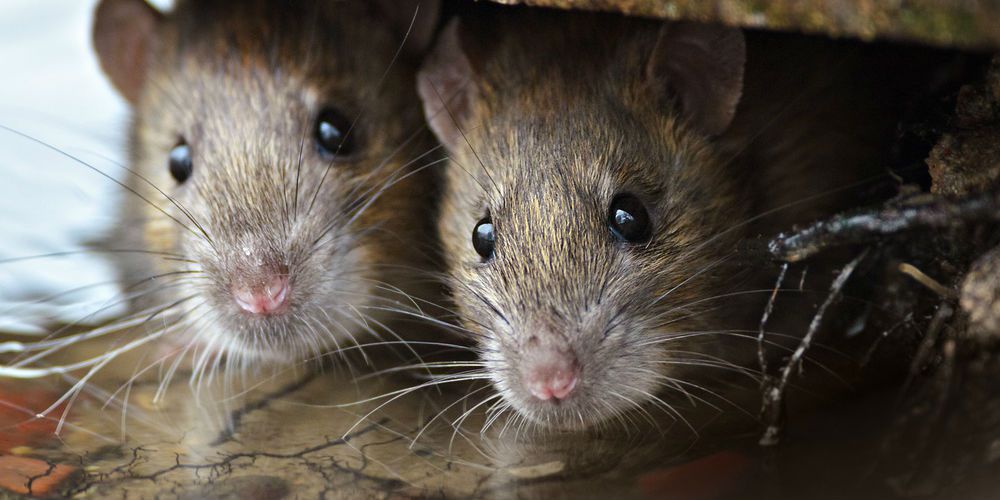Rats have been a nuisance to human habitation for all of recorded history. They can spread disease, damage property, and reproduce quickly.
Additionally, rats are quick and difficult to catch, and are small enough to fit into many hiding spots. They are known to travel as much as 300 feet to locate food, making their nest hard to find.
Health Concerns and Property Damage From Rat Infestation
Rats can cause health risks to humans and animals they come in contact with. Some of the diseases they spread include bubonic plague, typhus, Lymphocytic choriomeningitis, Wells syndrome, Lassa fever, leptospirosis, salmonellosis, rat-bite fever, hantavirus, typhoid and pneumonic plague.
They can also cause damage to electrical wiring, creating a fire risk, and chew holes in walls, drywall or doors. Rats are also known to chew through soft metals such as copper and aluminum, and damage plants and gardens.
Signs of Rat Colonies
Some common signs that a rat colony is nearby include:
- Rat droppings
- Chew marks
- Small rodent footprints where food is stored
- Damage to cardboard, wiring, wood or other materials around the home
- Noises in the wall or attic, sounds like scurrying
- Musky odor in rooms not often used
Here are some methods of getting rid of rats outdoors.
Seal Up Entryways to Home
Before you eradicate rats and mice from your yard, make sure that every crevice to your home, garage, outside sheds, or other structures on your property are sealed up. Make sure there are no rats living in these structures before sealing them up, as they will look for a place to nest as you push them away from your property.
It is very important to seal even the smallest crevices. Rats and mice can squeeze through extremely small cracks by flattening their body.
Use weather stripping, wire mesh, door seals, or spray foam to close off these crevices. Some people will say to use steel wool to seal off small entry holes, but rats will usually push right through.
Rats usually build nests in the attic, in overgrown shrubs or landscaping, in wood piles or where clutter is accumulated.
Keep Yard Free of Clutter Junk and Wood Piles
Rats like to hide in places where humans are nearby. When your yard is filled with clutter, this gives more opportunities to the rats to build a nest. Rats can have about 12 babies a year, so the rat colonies can grow quickly.
If you have a firewood pile, or stacks of scrap wood, rats can also hide in these crevices. By keeping your property clean and organized, rats are less likely to find a safe place to hide and multiply.
Keep Pet Food Put Up When Not in Use
Be sure to feed your dogs or other pets only what they need, and make sure they eat what is in their bowl. Remove any excess food and store it in a sealed container. Rats love to eat dog food or cat food, and can subsist off of this food very easily.
Secure Garbage Cans
Make sure your garbage cans and recycle bins are sealed shut and cannot be opened easily. Many municipal garbage bins have heavy lids to prevent rodents from opening them. Rats can live of off just cardboard, so make sure your outside sheds are free of cardboard, and recycle bins are tightly shut. Additionally, rats are known to eat garbage, and can thrive off waste food that is not put in a tightly sealed garbage can. Make it as difficult as possible for rats to find sustenance on your outside property.
Eliminate Compost Piles
While composting is ecologically sustainable, it provides a buffet for rats. Your waste food like coffee grounds, citrus peels, old vegetables, eggshells, and other discarded organic matter is all food for a rat colony. If you suspect a rat colony is on your property, eliminate your compost pile and take away a food source.
Keep Outdoor Garden Far From House
If you have a garden on your property, keep it as far from your home as possible. Rodents and rats can eat food found in the garden and subsist from that food.
Clean Barbeque After Every Use
While it is fun to grill steaks, burgers, and chicken on the barbeque during warmer months, the drippings and char can be a source of nutrition for rats. Remember that rats will eat just about anything to satisfy their hunger.
Be sure to clean your barbeque and grill thoroughly after each use. Make sure the air vents are shut tight, and secure the lid tight so no rats can enter the barbeque chamber when it is closed.
Keep Bird Feeders Elevated, Trim Tree Limbs
Rats can climb tree trunks and branches, so be sure to keep those trimmed so they can’t scurry from one tree to another. If you have bird feeders in your yard, make sure you elevate those to make them difficult to reach for a hungry rat. Cutting off all food supply sources will discourage rats from taking up residence in your yard.
Keep Pet Waste Picked Up
This one is a bit disgusting, but there is another reason to keep pet waste picked up each day. Not only is it sanitary, but rats can also eat poop and get nutrition from it if they are desperate. The waste matter in your pet’s yard can be a source of sustenance for a nasty rat colony.
Trim Shrubs and Ivy
Rats look for places to hide that are close to humans, but where they are relatively unseen. They love hidden places like attics and sheds. Another place they tend to congregate is in overgrown foliage, like ivy, shrubs, and tall grass. Keep your landscaping neat and your plants trimmed back so rats don’t have another place to build a hidden nest.
Place Lethal Rat Traps Around Your Home
Setting rat traps along the edge of your house and other outside buildings will help thin the rat colony population. Rats do not like to travel across open spaces, so they will stay close to the edges of buildings and perimeters.
There are different types of rat traps you can use. Some are non-toxic traps that lure the rat into a small enclosed area, where a “kill bar” delivers a lethal blow. Others are the traditional “snap shut” rat trap, which usually crushes the rat and breaks their spine. Glue traps trap the rat to a sticky surface, but prolong suffering, as the rodent slowly dies.
When placing the traps, do not place them with your bare hands, as your human scent will transfer to the traps and might prevent the rats from coming too close. If possible, use gloves or newspaper to handle the traps as you place them.
Rodenticides are a good option for rodent control, we place rodent baits in tamper resistant bait stations that prevent children, pets and and non-target animals from coming in contact with the contents of the bait station. We use the new California approved rodenticides for exterior rodent control.
Using Dry Ice to Kill Rats
In the community of Ferndale near Detroit, Michigan, residents sometimes use dry ice to kills rats in their burrows. The dry ice produces carbon dioxide, which fills the burrows, putting the rats to sleep as they die. This may not be a practical means of rat elimination for many people, as the burrow entrance may be hard to locate, and dry ice is extremely cold, requiring special gloves to handle without damaging your skin. This is not a method of rat extermination you can use in an enclosed area or near pets, as the gas can be harmful if breathed.
What About Sonic Rat Deterrents?
You may have seen products that emit a high-pitched frequency that rodents hear, that is supposed to deter them from coming near. There is no conclusive evidence that these have a long-lasting deterrence factor. Some experts believe that the rats become used to the sonic pitch, and learn to ignore it.
Watch for Rats During the Daytime
Rats are primarily nocturnal creatures, and most of their activity is at night. If you start seeing rats in the daytime around your home or in your yard, this is a sign that the colony has grown to an extensive size. Contact a rodent exterminator if you notice rats during daylight hours.
Call a Professional Rat Exterminator
If you have tried to manage the rat population in your yard, but you see evidence that they are still there, it may be time to call in a professional. A pest control expert can make sure that the rat infestation is taken care of once and for all.
Rat and Rodent Control in Los Angeles
If you are seeing rats in the daytime, or believe there is an infestation that requires professional help, contact American Rat Control and we can help you rid your home or property of rats. We serve the Los Angeles area, including Culver City, Inglewood, and South Los Angeles.








